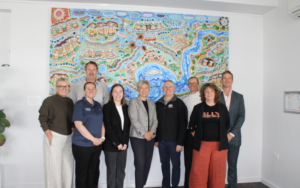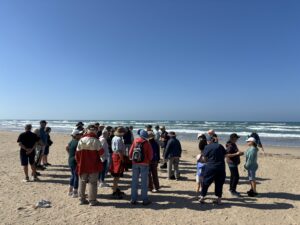New research of the Goyder Institute for Water Research has evaluated the potential for developing a sustainability rating system for the management of water resources in South Australia.
A team of researchers led by Dr Bethany Cooper of the University of South Australia, have found that it would be advantageous to develop an environmental, social and governance (ESG) rating system for water sources across South Australia, and have identified some key considerations for this undertaking.
The purpose of a ‘water resource rating system’ is to provide a high-level but robust mechanism for identifying where water sources, whether native (i.e., natural waterways and groundwater systems) or manufactured (e.g., desalinated, recycled wastewater, stormwater, etc.), are delivering on sound environmental and cultural/social (including economic) fronts and are judiciously governed.
Most rating systems are based on underlying scores that are then aggregated in a way that provides meaning to a range of stakeholders, including non-experts. Common examples include energy and water rating systems for household appliances (based on a star rating). These types of ratings help guide choices and investments by individuals, enterprises and governments. Arguably, a water source rating system could do the same.
A literature review found that no ESG rating scales for water sources are currently available at the state-scale, although some exist at the site scale. Given that such a system necessarily involves some form of multi-criteria analysis, published literature can guide how to limit the criticisms associated with this approach. The Driver-Pressure-State-Impact-Response (DPSIR) framework was found to have potential for guiding the development of a water rating system. Other natural resource rating scales/indices also offer some direction, especially around potential risks.

The research team also conducted stakeholder consultations and found that a water source rating system based on ESG principles has broad support from water users, other government agencies and investment communities. South Australia (SA) has an opportunity to take the national lead on this front, although ultimately a national system is likely to hold more weight. Continued involvement with stakeholders will be required to optimise the design of the rating system and to ensure that it adds value and does not compete with existing ESG work across different groups.
Potential end-users for the water source rating system comprise the South Australian Government, industries that might be attracted to the notion of being able to report their activities against/within the rating system and investors who are looking to ensure that their funds are being applied to projects that are aligned with their values. Having a rating system that can be consistently applied across the state would allow each of these users to make more informed choices.
The overall conclusion of the study was that it is feasible to produce a water rating system based on water sources at the level of the state, however this would be a significant undertaking. The authors recommended a stock-take of existing information to gain insights into the workplan that would be required.
The research is informing efforts by the South Australian Department for Environment and Water (DEW) to ensure the sustainable management of the state’s water resources in a manner that facilitates economic development. It has contributed to all Impact Areas of the Institute’s Strategic Plan 2020-2023, given the overarching vision of the Institute is to enhance the vibrancy of communities of South Australia and Australia by being a leader of impactful research for sustainable, innovative and integrated water management.
More information about the project is available in the research report or by contacting the Director of the Goyder Institute, Dr Kane Aldridge.



